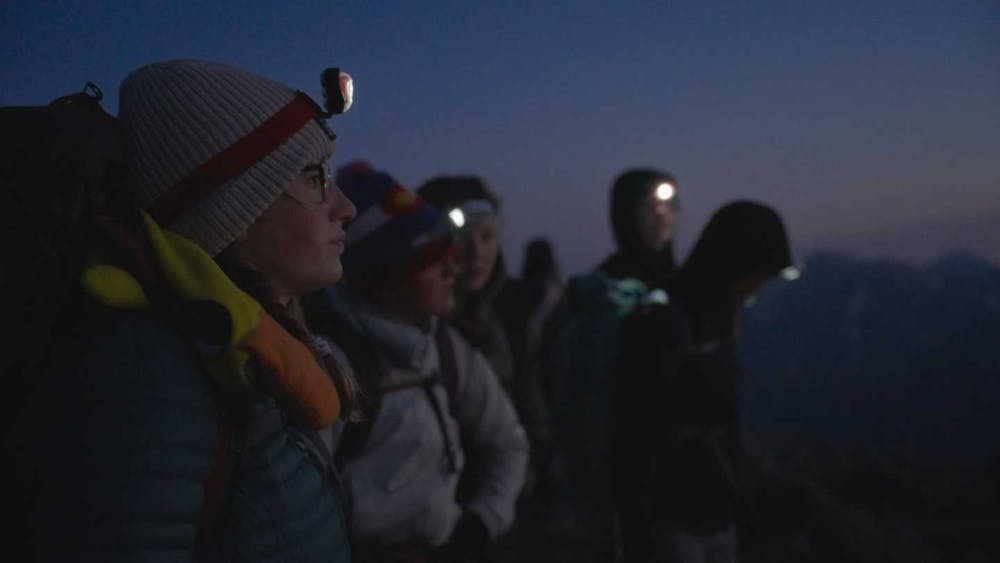October Update: Help A Parent Out!

For many, including all of us at camp, October is a time of transition. The changing leaves, which are in their full glory at the beginning of the month, are suddenly on the ground by the end of the month–sometimes blown down by the first major snowstorm of the season. The annuals we planted in the early summer eventually succumb to the first hard freeze, their colors bright one final time under the glaze of frost. Even though there is a light melancholy to the changing of the seasons–fall is also the (second) favorite season for most of us at camp. We love the blue sky, golden leaves, bugling elk, bright stars, down jackets in the morning, the changing azimuth and zenith of the sun, and the time to reflect back on the summer: lessons learned, skills gained, and experience deepened.
Fall is also the time when students begin to consider their own transitions into college, life and the world. Staff members call to talk about career trajectories and ask for references while campers email and request college recommendation letters. In these requests and conversations, we all have the opportunity to slow down, take a look back over the last summer, the last four years, the last twelve years and think, “Wow. I did that.”
When transitions are big, and we are younger, it is often much easier to see the Before and After. As we age, it feels like our buckets are ever-filling and regularly overflowing, and we aren’t always sure if we are doing enough or doing the right things for the right people at the right time. For parents, this is showing up in the data. At the end of August, the U.S. Surgeon General issued an Advisory on the Mental Health and Well Being of Parents and, basically, many parents in a variety of facets of their lives are having a rough go of it.
“Throughout their lifespan, parents and caregivers often face heightened stressors, including financial strain and economic instability, time demands, concerns over children's health and safety, parental isolation and loneliness, difficulty managing technology and social media, and cultural pressures.”
We know that these stressors “disproportionately burden some parents and caregivers“ who have “fewer resources” or “who experience economic, social, political, and cultural marginalization.” Yet each of our own individual perceptions inform our realities, and for many parents today, “societal expectations, norms, and pressures to meet perceived parenting standards can contribute to stress as well.” We see that at camp when our campers ask to check their AP scores in the middle of the summer or when we hear about kids who can’t ever come to camp because they need to play club sports throughout the summer to “get the scholarship” for college.
“As technological and economic forces have reshaped the world at a rapid pace, parents may find it more difficult to prepare children for a future that is harder to anticipate. Further, a modern practice of time-intensive parenting and contemporary expectations around childhood achievement may contribute further to the stressors faced by parents.”

So what is a parent, guardian or caregiver to do? Like we say to our camp counselors, “Just be your best self.” That seems like a tall order until you realize we have also already said, “And your “best” will look different on any given day.” Krista White, our High Trails director, gently reminds staff members to make your “To-Do’s” into “Tah-Dah’s.” Got your campers to the lodge before the Thought for the Day? Tah-Dah! Only had two spilled milks at the meal? Tah-Dah! Everyone has a water bottle? Tah-Dah! Pretty sure everyone brushed their teeth at least once? BIG Tah-Dah!
Even bigger than these task-based “Tah-Dah’s” are the real moments when kids find the opportunity to learn more about themselves, others or simply be heard by a supportive adult. Amy Scott, a therapist who has worked with our staff in years past, reminded us that, “almost my entire job is simply holding space and listening…I don’t really ever “fix” anything.” She also talks about the emotional waves we all experience: they are big, scary and eventually come crashing down…and then dissipate. When we can “ride the emotional wave” of a child’s big feelings with them (their fears, their shame, their confusion) we help them know it is both okay to feel strong emotions and help them know we also think they are amazing.
It’s time we give parents the same sense of support and community as our campers (and most of us) felt at camp. Murthy writes in the Advisory,
“we need to talk openly about the stress and struggles that come with parenting. The truth is, many parents and caregivers have a tough time with the evolving demands of parenting—from financial strain and family issues to adjusting to life with rapidly changing technology, and managing mental health challenges for themselves and their children. Many parents also struggle with a modern practice of time-intensive parenting and contemporary expectations around childhood achievement that tells them if they are not doing more and more for their children in the escalating race for success, they will fail as parents. Open dialogue about these challenges can combat feelings of shame and guilt and cultivate mutual support. It can also help build the momentum needed to ultimately shift practices and collective expectations to be more consistent with health and well-being.”
Even though you may never have had kids of your own, you are undoubtedly connected to people who have, are or will be raising children. If you have grown kids, reach out to them. If you are actively in the throes of parenting, pour yourself a cup of tea and go sit under one of those beautiful fall trees with a friend. Put on your best camp counselor hat and check in on them. Find out what is going well and what isn’t, remind them about their daily “Tah-Dah’s” and help them reflect back on the day, week, month, year and collective years so they can say to themselves once again, “Wow. I did that.”

